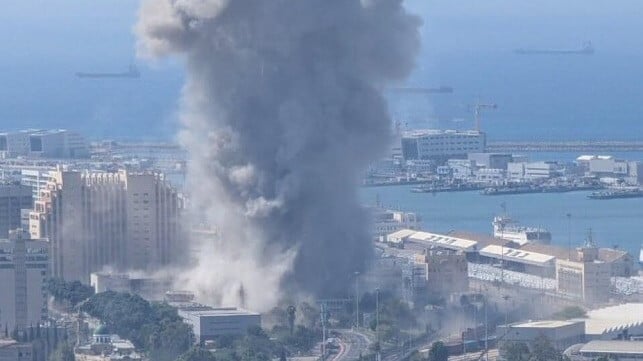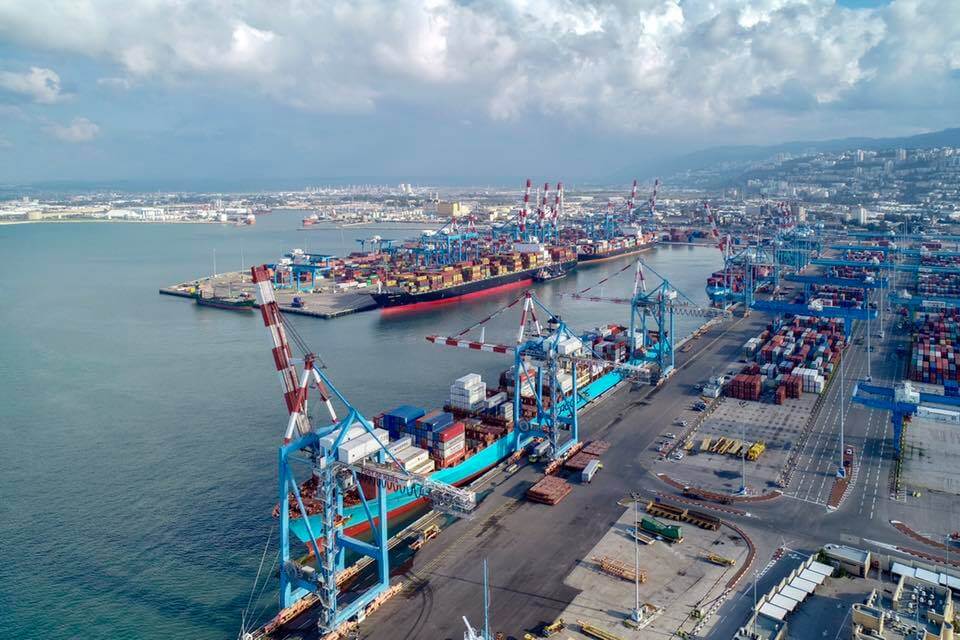Haifa is Attacked Shortly After Maersk Suspended Its Service

In an unusual daytime assault, Iran launched missile barrages targeting the Israeli port city of Haifa as well as other regions of the country. The attack came just hours after Maersk issued a customer advisory reporting after “carefully analyzing threat risk reports,” that it would suspend port calls to Haifa.
The Israeli military issued an alert on Friday afternoon for an incoming missile attack with reports of sirens sounding in Haifa and other areas. According to the reports as many as 23 ballistic missiles were targeted at Haifa with reports of one or more loud explosions. One appeared to hit near the center of the city while media reports said there were three impact sites to the west of Haifa in the area of Shfar’am, which is an Arab district.
Clouds of smoke are rising from Haifa port after it was targeted by Iranian missiles. pic.twitter.com/PwrL5lVGvz
— Tehran Updates (@TehranDefence) June 20, 2025
Most of the citizens were able to reach shelters before the missile attack, but medical sources are saying that 17 people were injured in the attack on Haifa with three including a 16-year-old boy seriously injured. There have not been reports of causalities from the strikes in south and central Israel during the same attack.
Speculation is that the oil refinery near Haifa may have been the primary target. It is unclear, but it seems the attack missed the port itself. Haifa is a critical port as it accounts for a third or more of Israel’s container imports. Approximately 98 percent of Israel’s trade is seaborne. Operations in the port are run by India's Adani Ports which won the contract to privatize Haifa's terminals in 2022.
"The port at Haifa is Israel’s busiest and most important link enabling international trade and exports as well as receiving and processing import containers supplying goods to the local population. Any degree of constraint to the accessibility of these and other ports in the region will add significant pressure to the remaining infrastructure as companies scramble to secure capacity and services to other entry and exit points across the region," said Gartner VP analyst David Gonzalez.
“Maersk has made the decision to temporarily suspend vessel calls at the Port of Haifa, Israel, and also suspend cargo acceptance for Haifa,” the company informed customers. It emphasized that the safety and security of its seafarers and operations are its top priority.

Haifa is a critical port accounting for as much as a third of Israel's container volume (Port Authority)
Well-known industry analyst Lars Jensen commented that it is an “open question” of whether additional operators will follow suit. Earlier in the week, CMA CGM said “We confirm that maritime transport activities are proceeding as normal in the area, and our operations and logistics chains remain unaffected.” It however said it has “activated a dedicated monitoring cell to watch closely all developments.” Other carriers such as MSC Mediterranean Shipping have not made public statements.

that matters most
Get the latest maritime news delivered to your inbox daily.
Jensen notes that Maersk updated him clarifying the development noting it “specifically only encompasses Maersk-operated vessels, which means that Maersk-booked cargo moving on other providers' vessels should not be affected for now.”
Maersk’s online schedule system reflects ships diverting from Haifa to the Port of Ashdod in central Israel. The 2,500-TEU Maersk Norfolk shows that it is now en route to Ashdod according to its AIS signal and the online schedule. The Johannes Maersk (3,000 TEU) operating a loop between Northern Europe and the Mediterranean is also now scheduled to call in Ashdod.
